| Srl | Item |
| 1 |
ID:
077423
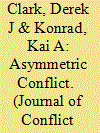

|
|
|
|
|
| Publication |
2007.
|
| Summary/Abstract |
The authors study conflict on multiple fronts. A defending player needs to successfully defend all fronts, and an attacker needs to win at only one. Multiple fronts result in a considerable disadvantage for the defending player, and even if there is a defense advantage at each of them, the payoff of the defending player is zero if the number of fronts is large. With some positive probability, in the equilibrium defending players surrender without expending effort
|
|
|
|
|
|
|
|
|
|
|
|
|
|
|
|
| 2 |
ID:
180183


|
|
|
|
|
| Summary/Abstract |
A central issue that is discussed in climate policy is the fear of owners of stocks of fossil hydrocarbon deposits that high CO2 taxes and bans on the combustion use of hydrocarbons will turn their stocks into stranded assets. They might react by extracting and selling their reserves today: a rush to burn results. We show how the stranded-asset problem could be avoided or strongly moderated. We analyze a simple intertemporal equilibrium with a given stock of fossil hydrocarbons. The key variable for a climate-neutral solution to the rush-to-burn problem is to maintain existing and generate new markets for climate-neutral products from fossil hydrocarbons in the future. We give examples of such products. In this framework subsidies for such products (or for their innovation) also reduce the rush-to-burn problem. In contrast, the creation of substitutes for fossil hydrocarbon-based climate-neutral products, or subsidies for such products reduce the market for products made from fossil hydrocarbons. This aggravates the stranded-assets problem and thus has a climate-damaging effect.
|
|
|
|
|
|
|
|
|
|
|
|
|
|
|
|
| 3 |
ID:
144788
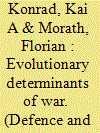

|
|
|
|
|
| Summary/Abstract |
This paper considers evolutionarily stable decisions about whether to initiate violent conflict rather than accepting a peaceful sharing outcome. Focusing on small sets of players such as countries in a geographically confined area, we use the concept of evolutionary stability in finite populations. We find that players’ evolutionarily stable preferences widen the range of peaceful resource allocations that are rejected in favor of violent conflict, compared to the Nash equilibrium outcomes. Relative advantages in fighting strength are reflected in the equilibrium set of peaceful resource allocations.
|
|
|
|
|
|
|
|
|
|
|
|
|
|
|
|
| 4 |
ID:
133718
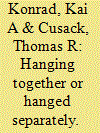

|
|
|
|
|
| Publication |
2014.
|
| Summary/Abstract |
What is the strategic role of membership in an intergovernmental group with unanimity requirements if the group negotiates with an external player in a setting with incomplete information? Being in such a group has a strategic effect compared to negotiating as a stand-alone player and reduces the demands of the outside player. Group membership lends additional bargaining power. Negotiating as a group may also cause more inefficiencies due to bargaining failure, and this may harm also the intergovernmental group. We uncover the role of preference alignment and preference independence between members of the coalition group for equilibrium payoffs and welfare effects. In this analysis, we also distinguish between coalition groups with and without side payments. Overall, coalition groups tend to perform well for the members of the coalition group in comparison to fully decentralized negotiations, particularly if the objectives of the members of the coalition group are not always perfectly aligned.
|
|
|
|
|
|
|
|
|
|
|
|
|
|
|
|
| 5 |
ID:
156538
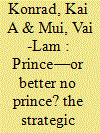

|
|
|
|
|
| Summary/Abstract |
Appointing a successor (the “prince”) allows the ruler (the “king”) to alter the structures of conflicts that take place between him and his potential challengers, as well as the structures of conflicts that take place among his potential challengers. Motivated by historical examples and using an infinite horizon rulership competition game, we show that while an appointed prince constitutes a powerful and dangerous threat to the incumbent ruler (the elevated threat effect), the appointed prince can also offer the incumbent ruler increased protection against other potential challengers (the barrier effect). We determine conditions when the overall effect of appointing a successor benefits the incumbent ruler and enables him to acquire a larger share of the governance rent in equilibrium.
|
|
|
|
|
|
|
|
|
|
|
|
|
|
|
|
| 6 |
ID:
078688
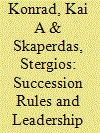

|
|
|
|
|
| Publication |
2007.
|
| Summary/Abstract |
Leaders compensate supporters not just for performing their duties but also to preempt an overthrow by the same supporters. We show how succession rules affect the power of leaders relative to supporters as well as the resources expended on possible succession struggles. We compare two regimes of leadership succession: the conclave regime and the divide-et-impera regime, which differ with respect to the role of supporters of the previous leader once the new leader takes power. The leadership rent is higher, and supporters receive a lower compensation in the divide-et-impera regime, as supporters have to fight harder for succession to avoid the grim outcome of loss. A leader, then, would like to induce the divide-et-impera regime even when every supporter has veto power over her leadership
|
|
|
|
|
|
|
|
|
|
|
|
|
|
|
|